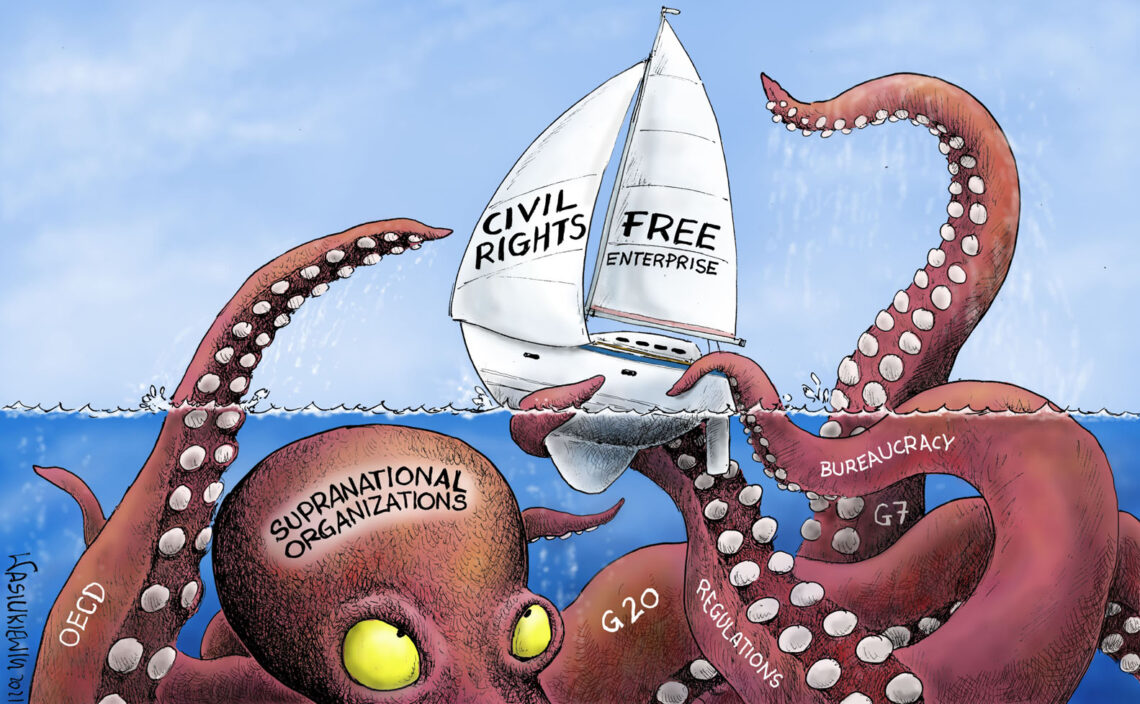Supranational bodies and the lack of democratic accountability
Supranational bodies are expanding their influence by promoting global tax harmonization. In cahoots with politicians, they covertly advocate for systems that ramp up the tax burden and weaken the very foundation of democracy.

Supranational organizations are gaining in global influence. While they can be useful and in some instances even necessary, they lack democratic accountability. This flaw, however, has not prevented them from expanding. The United Nations is the most notable example. Another such organization is the G20, a platform where 20 of the largest economies meet, chosen so that all continents are represented.
Other supranational bodies are partially dependent on the UN, like the World Health Organization (WHO). The Organisation for Economic Co-operation and Development (OECD) was established to provide statistical data. It has 37 members, including most of the larger prosperous countries; the organization claims to be democratic and support free markets.
Staggering deficits
All G20 countries have run up huge debts. Their leaders differ on many issues, but they all support high taxes and tighter control of the citizens. As a result, the OECD has become a perfect tool to promote global tax harmonization and covertly advocate for systems that ramp up the tax burden and use the fiscal system as a political tool. The buzzword is redistribution, a concept born out of envy.
Over the last 40 years, massive government spending programs – frequently misdirected – have led to public debts of enormous proportion. These debts are run up by territorial entities, such as government, states, provinces, and the like. As a result, global public debt has approached some $60 trillion, or $7,500 per person in the world. As of this writing, public debt in Japan stands at over $96,000 per capita; in the United States, it has exceeded $50,000; in Italy, it is nearly $38,000 and in Germany over $34,000.
The OECD has become a perfect tool to promote global tax harmonization and covertly advocate for systems that use the fiscal system as a political tool.
Looking forward, the various Covid relief funds and outsized economic stimulus programs such as those championed by President Biden, plus government incentives to accelerate the development of a “green economy,” are all sure to make the global debt rise exponentially. Governments’ foolish, unconstrained spending comes from believing that central banks can create money with practically no limits.
Simultaneously, the OECD and some economists argue that harmonized taxes should prevent the so-called “race to the bottom,” with some nations attracting business investment “unfairly” via lower taxes. Another pillar of the harmonization narrative is the large profits made by transnational internet giants that pay little taxes. Such cliches make the harmonized tax cartel seemingly attractive, but in reality, the plan would amount to a severe blow for the entire economy.
It is known that high taxes are harmful: they undermine society’s prosperity and benefit only rent-seekers in government and the crony system that surrounds them. Such an environment has developed, for example, around the G20 governments and the OECD, but also within the endlessly growing public service sector. (The issue is not our valuable, loyal and dedicated civil servants; it is the expansion of an unproductive bureaucracy that poses a systemic problem.) The OECD clears the path for such a system with its studies, propaganda and by “shaming” countries reluctant to go along. Those that resist are threatened with sanctions. And as of now, the European Union is preparing a tax harmonization plan on its territory.
Accountability problem
OECD procedures lack democratic accountability, despite the organization’s pretense of standing for democracy. Creating a tax cartel is a planned economy solution; it eliminates competition and free markets. By endorsing the measure, the OECD is blatantly betraying its charter. Cartels are harmful because they eliminate incentives provided by competition. The proposed tax cartel would allow countries to retain a high level of spending with less risk of adverse consequences.
Accountability in fiscal matters is already a problem in Western democracies. In theory, parliaments are there to make sure that governments are spending citizens’ money wisely. However, this controlling role has largely disappeared in the evolution of political parties. Members of parliaments are mostly professional politicians living off the state. Their financial well-being is dependent on the system. As a result, the legislative branch has, in fact, the same interests as the executive and aligns with it. This collusion is undermining the foundation of democracy.
High taxes undermine society’s prosperity and benefit only rent-seekers in power and the crony system around them.
Global centralization is increasingly fashionable. The drive takes different forms, also under the umbrella of “multilateralism.” Centralization is promoted by national or regional leaders and by supranational organizations.
The Biden administration has jumped on the bandwagon as well, with its “America is back” slogan. The White House now promotes a global tax cartel, in line with ideas already espoused by the OECD. The administration’s scheme calls for a worldwide minimum taxation requirement, regardless of the interests of particular states or regions. It also proposes a waiver of intellectual property rights on vaccines under the pretext of fighting Covid more effectively, even though patents are not the problem, but rather production bottlenecks and logistic hurdles.
The EU, in its eagerness to regulate, has also endorsed tax harmonization. Brussels aims to be a “regulatory superpower,” imposing uniform standards on the whole world.
Accountability, freedom of choice and self-responsibility are under threat. The elimination of competition through cartels is curbing the drive for excellence and efficiency. Overregulation and excessive bureaucracy are impeding creativity and innovation. The result can only be mediocrity and a loss of freedom.
